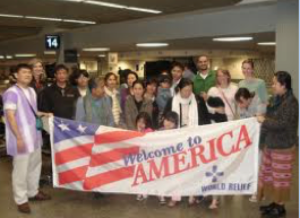 [Cherie Gray is the Executive Director of the Tucson Refugee Ministry in Tucson, Arizona. Her website is Tucson Refugee Ministry. I consider her one of the foremost experts on refugee assimilation in the U.S.]
[Cherie Gray is the Executive Director of the Tucson Refugee Ministry in Tucson, Arizona. Her website is Tucson Refugee Ministry. I consider her one of the foremost experts on refugee assimilation in the U.S.]
“It’s you!!” Like a deer in headlights, I stared at the smiling man, unable to place his face. “It’s you”, he said again, “You’re the one!”. Caught off guard, I wasn’t sure how to respond to this Arabic gentleman. “Do you remember me?” he asked. I desperately scrolled through my mental address book – searching for a clue but drawing a blank. Still insistent, he took off his glasses and stated emphatically, “Now you recognize me?!” I couldn’t place him, but he quickly filled in the blanks explaining, “You were there when my family and I arrived at the airport two years ago.”
After cries of joy and many warm greetings we made our way into the room where we were both attending a dialog between Muslims and Christians called “Loving God – Loving Your Neighbor”. Instead of finding a chair nearby, he made his way to the podium. When he was introduced I silently gulped. This was the Imam!! He offered some opening statements extending gracious greetings, then while I was still putting the pieces together, he pointed me out saying, “This is my friend. She welcomed my family when we first arrived in America. She is an example of loving God and loving your neighbor”. Although that night at the airport had been a small effort for me, he and his family remembered my face and that welcome was permanently imprinted in their memories. (That night also relaunched an amazing relationship with the Imam and his family that continues to this day!)
Loving our “neighbor” may not be the obvious (or the easiest) choice. It might mean crossing the street to help someone from an “enemy” country – someone who has been beaten and has stared down death. It may involve binding their wounds, putting them on our own “donkey” and taking responsibility for their recovery. We won’t be surprised when governments hurriedly cross to the other side of the road – their budgets too overburdened for them to stop and help. We won’t be disappointed when non-profits and charitable organizations are overwhelmed by the magnitude of the crisis, and start looking the other way. We, as followers of Jesus, are uniquely suited to be the Good Samaritans!
Here are more ways we can reach out to our New American neighbors:
- Stick your toe in the water. Make a commitment together to serve for a specific period of time, with clear boundaries. Ensure everyone involved agrees on what is expected during this timeframe. Consider a “milestone party” at the end of your commitment – to celebrate the interesting things that all of you have learned from each other.
- Pencil It In. Schedule your visits with your international friends – literally put those visits on your calendar. (For Americans, if it’s not on the calendar, it’s not going to happen!) Time is the most precious gift we can give. Invite your pastor or one of your church leaders to come with you to visit your new friends at least once.
- Empower. Avoid the “Fairy Godmother Syndrome”. Giving gifts, meeting needs, and endeavoring to fix everything can leave those we are trying to assist feeling helpless and dependent. Empower your new friends to stand on their own two feet. They are amazing, resourceful, creative survivors to have made it this far! If they ask for help with financial or material needs, point them to God and remind them that He is the Provider. Offer to pray together about their needs. If you still feel led to help with a specific need, first consult their agency case manager, confirm it is a valid need, and give anonymously through them.
- Radical Hospitality. Invite your new friends over for a meal. Hospitality is their love language, and it is a great honor for them to be invited to an American home. Hospitality trumps all other arguments (i.e. – “if they see my house, they will think I’m rich”). What we share with our international friends over the kitchen table will be repeated to their beloved relatives in faraway homelands. Cross-continental conversations happen almost daily via Skype, Viber and WhatsApp.
“Americans are not like what we expected!” an Afghani refugee told her volunteer. The Afghani lady was evasive when asked what they had anticipated – and how they had arrived at those assumptions. She hastily offered, “I tell my family back home – Americans are so nice! They ask me to come to their home! They are so friendly!” Hmmm – reminds me of I John 4:18, “There is no fear in love”!